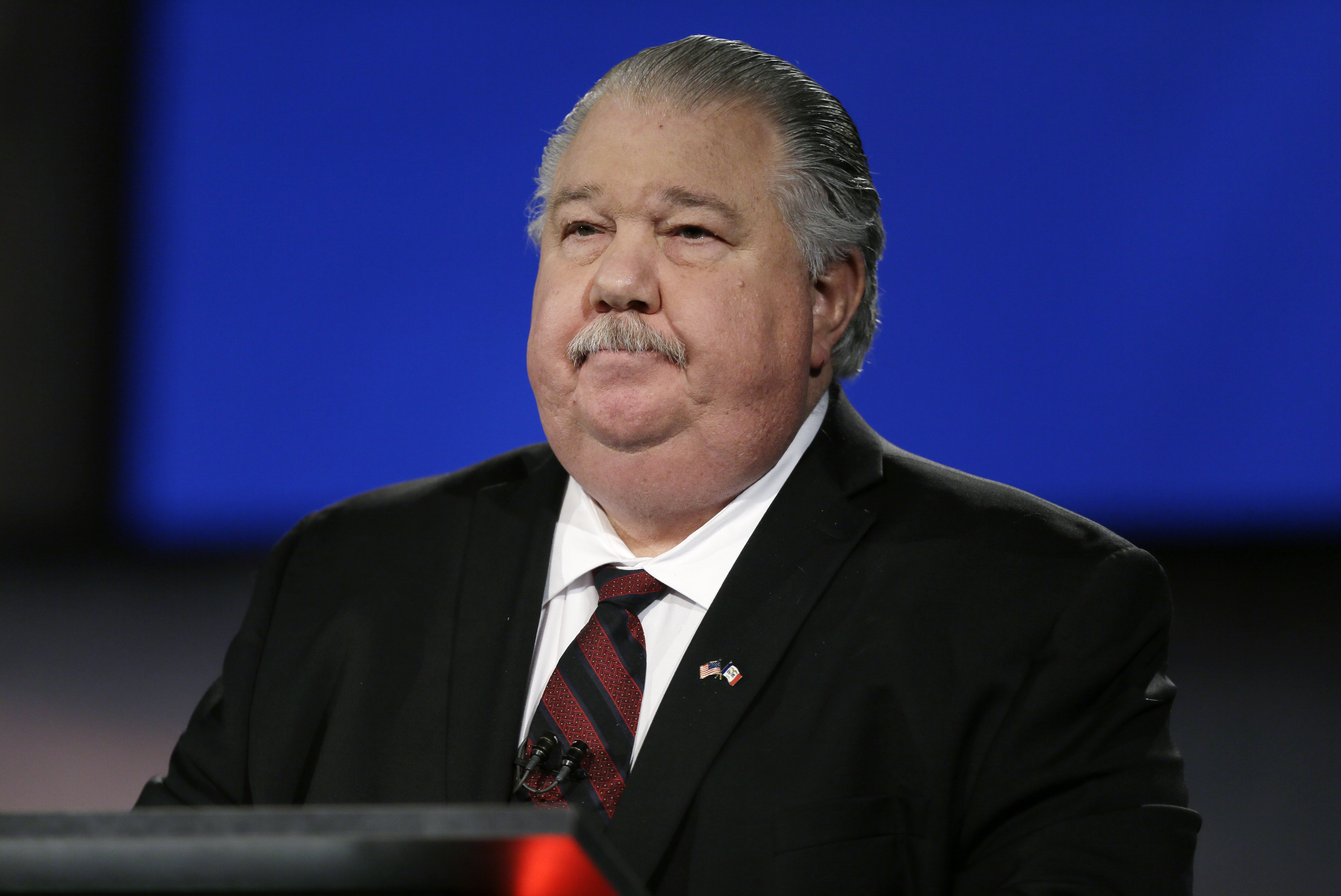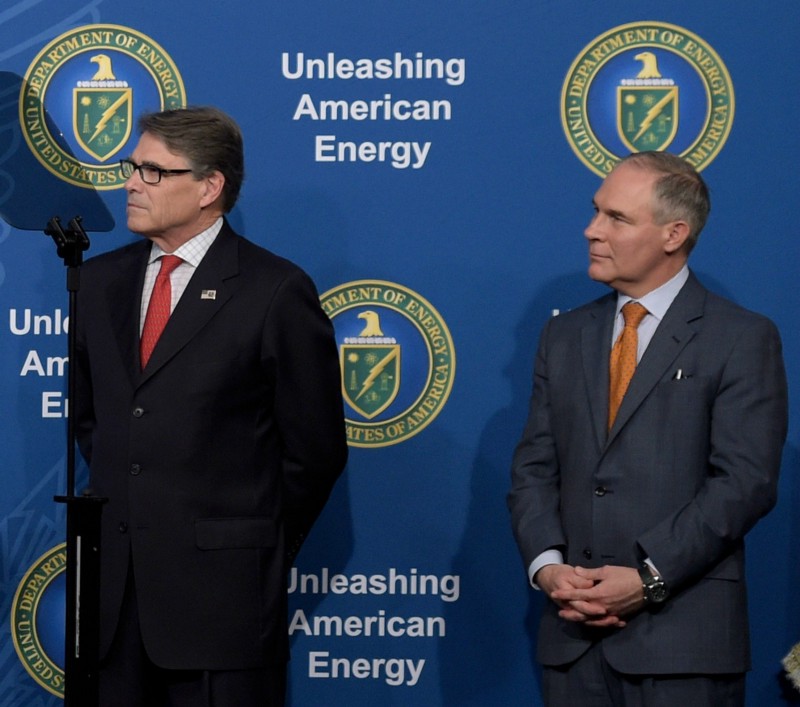Several key environmental and energy positions have yet to be filled 14 months into the presidency of Donald Trump.
Of a total of 14 high-level political positions at the Environmental Protection Agency (EPA), eight remain empty, including the agency’s deputy administrator and its head of chemical safety. At the Department of Energy (DOE), Trump has yet to fill leadership positions in the department’s renewable energy and advanced technology offices.
But based on the track record of the nominees who have won Senate confirmation so far, Trump’s slow pace in filling these vacancies may not be a bad thing according to one environmental group — the fewer anti-environment, pro-pollution candidates who fill positions in his administration, it says, the better off the nation will be.
“Any day a coal lobbyist or chemical industry shill aren’t holding top jobs in Trump’s EPA should be considered a ‘good day’ by the American people,” Environmental Working Group (EWG) President Ken Cook said Tuesday in an emailed statement to ThinkProgress. EWG is a nonprofit group that focuses on protecting human health and the environment.
Among the confirmed nominees, EPA Scott Pruitt has emerged as the poster child for the Trump political environmental and energy appointee: a pro-industry, anti-environment ideologue. The administration has filled second- and third-tier positions at the EPA, Department of Energy, and related agencies with officials who have similar industry-friendly pedigrees.
Trump’s nominee to head the EPA’s Office of Air and Radiation, William Wehrum, came to the agency with numerous potential conflicts of interest. Confirmed by the Senate last November, Wehrum’s previous clients included the American Petroleum Institute, the American Fuel and Petrochemical Manufacturers, and the American Chemistry Council. Each of these trade associations filed litigation against the EPA under President Obama to weaken rules that could harm their member companies’ bottom line.
In late September 2017, a week before his confirmation hearing, Wehrum was still appearing in federal court on behalf of his industry clients. In the case, Wehrum argued against new standards meant to protect workers from airborne silica dust, which is so fine that particles can penetrate deep into the lungs and cause health problems, such as fatal lung disease and cancer.
Trump has announced a total 621 nominees to top government positions, compared with 730 during the same period under President Obama, 795 under President George W. Bush, and 703 under President Clinton, according to a nominee tracking project by the nonprofit Partnership for Public Service and the Washington Post. The project has been tracking hundreds of Trump administration nominations through the confirmation process.
According to ThinkProgress’ analysis of the data, the environment remains a low priority for the administration. Pro-industry individuals continue to take top roles and several nominees to environment- and climate-related positions at the EPA, DOE, and Department of Agriculture are still unnamed.
Along with Trump taking his time in officially selecting candidates, several nominees that were put forward have failed to win approval, despite Republicans holding a majority in the Senate.
After intense scrutiny of her history of fringe anti-science beliefs, the White House withdrew its nomination for Kathleen Hartnett White to lead its Council on Environmental Quality. Hartnett White is currently a senior fellow at the Texas Public Policy Foundation, which has received funding from ExxonMobil, Chevron, the Koch network, and the Heartland Institute. She has long cast doubt on widely accepted climate science.
Trump has yet to nominate a head of chemical safety at the EPA after Michael Dourson withdrew his name from consideration. Dourson, nicknamed the “voice of the chemical industry,” faced bipartisan opposition to his nomination to head the agency’s Office of Chemical Safety and Pollution Prevention. He runs a consulting firm whose clients included Dow Chemical, Koch Industries, and Chevron.
Earlier this month, Trump nominated another chemicals industry veteran to fill a senior spot at the EPA. If confirmed by the Senate, Peter Wright, an attorney for Dow Chemical, would serve as assistant administrator for the the agency’s Office of Land and Emergency Management. At Dow Chemical, Wright works as managing counsel for environmental health and safety. Earlier in his career, Wright had jobs at several law firms as well as the agriculture giant Monsanto.
Also at the EPA, the nomination of Andrew Wheeler — a former coal lobbyist — to serve as the No. 2 person at the EPA remains on hold, even though the Senate Environment and Public Works Committee approved Wheeler’s nomination in February, albeit in a 11-10 party-line vote.
An outspoken advocate for the coal industry, Wheeler has long questioned the mainstream consensus on climate change. In 2006, while working for the Senate environment committee, Wheeler suggested that the Earth might actually be going through a “cooling phase.”
“Public health would be far better served if Mr. Wheeler remains unconfirmed and another chemical corporation hired gun isn’t tapped to run chemical safety at EPA,” Cook told ThinkProgress. “If President Trump nominated people for these positions who actually have the experience and commitment in safeguarding human health and the environment from smokestack pollution and toxic chemicals, I’d bet they’d both pass with strong bipartisan support.”
The administration is also still looking to fill the chief scientist position at the U.S. Department of Agriculture after the president’s original nominee, Sam Clovis, withdrew his nomination after getting embroiled in the scandal over the Trump campaign’s relationship with Russian officials.
Agriculture businesses, including manufacturers of pesticides and fertilizers, strongly supported Clovis’ nomination as chief scientist for the department. At the time of his nomination, Christopher Jahn, president of trade association the Fertilizer Institute, said “American agriculture will find a knowledgeable and strong advocate in Dr. Clovis.”
The absence of high-ranking officials in several agencies hasn’t stopped the Trump administration from pursuing its goal of returning the government below the level of regulation in 1960. But these efforts to cut regulations are being handled by political appointees that do not need Senate approval.
Sen. Tom Udall (D-NM) said he has “tremendous amount of concern about political people running the departments instead of Senate-confirmed people within the agencies that have been through a vetting process,” according to an E&E News report. “If you just have a political person in there who’s just handling the politics, the decisions are not good,” Udall said.
Despite the absence of a chemicals safety head, the EPA has overhauled how it determines whether new chemicals pose a serious risk to human health and the environment. The agency will no longer require that chemical manufacturers who want to produce new, potentially hazardous chemicals sign legal agreements that restrict their use under certain conditions. The changes come in the wake of intense lobbying by the chemical industry, which complained that the EPA was taking too long to clear their chemicals for commercial use.
Chances are the next nominee to fill the top chemical safety position will come from the industry, even though Dourson was forced to withdraw his nomination due to his industry ties. Nancy Beck, one of the deputy administrators in the chemical safety office, came to the EPA from the American Chemistry Council, the leading lobbying group for the chemical industry.
At the DOE, Secretary Rick Perry has filled many of his agency’s positions that require Senate confirmation with alumni of Koch-funded, pro-fossil fuel think tanks. But DOE still has several open positions, including ones that focus on clean energy.
Trump has not nominated an assistant secretary to lead DOE’s Office of Energy Efficiency and Renewable Energy (EERE). As a supporter of coal and other fossil fuels, the president has proposed massive cuts to this office in both fiscal budget plans it has released since January 2017.
EERE’s mission is to help support the development of clean, renewable, and efficiency energy technologies and support a global clean energy economy. Under the White House budget proposal, the office’s funding would be cut by more than 65 percent for FY’19.
Daniel Simmons currently serves as DOE’s principal deputy assistant secretary of EERE, a position that does not require Senate confirmation. Prior to joining DOE last May, Simmons served as vice president for policy at the Koch-funded Institute of Energy Research, where he questioned the value of promoting renewable energy sources.
Another DOE position without a nominee is director of the department’s Advanced Research Projects Agency-Energy (ARPA-E), an agency modeled on the Department of Defense’s Department of Advanced Research Agency that funds research into long-term and high-risk energy technologies. As with EERE, ARPA-E is not a priority of the Trump administration. Trump would scrap ARPA-E and its $305 million budget in his FY’19 budget proposal.




